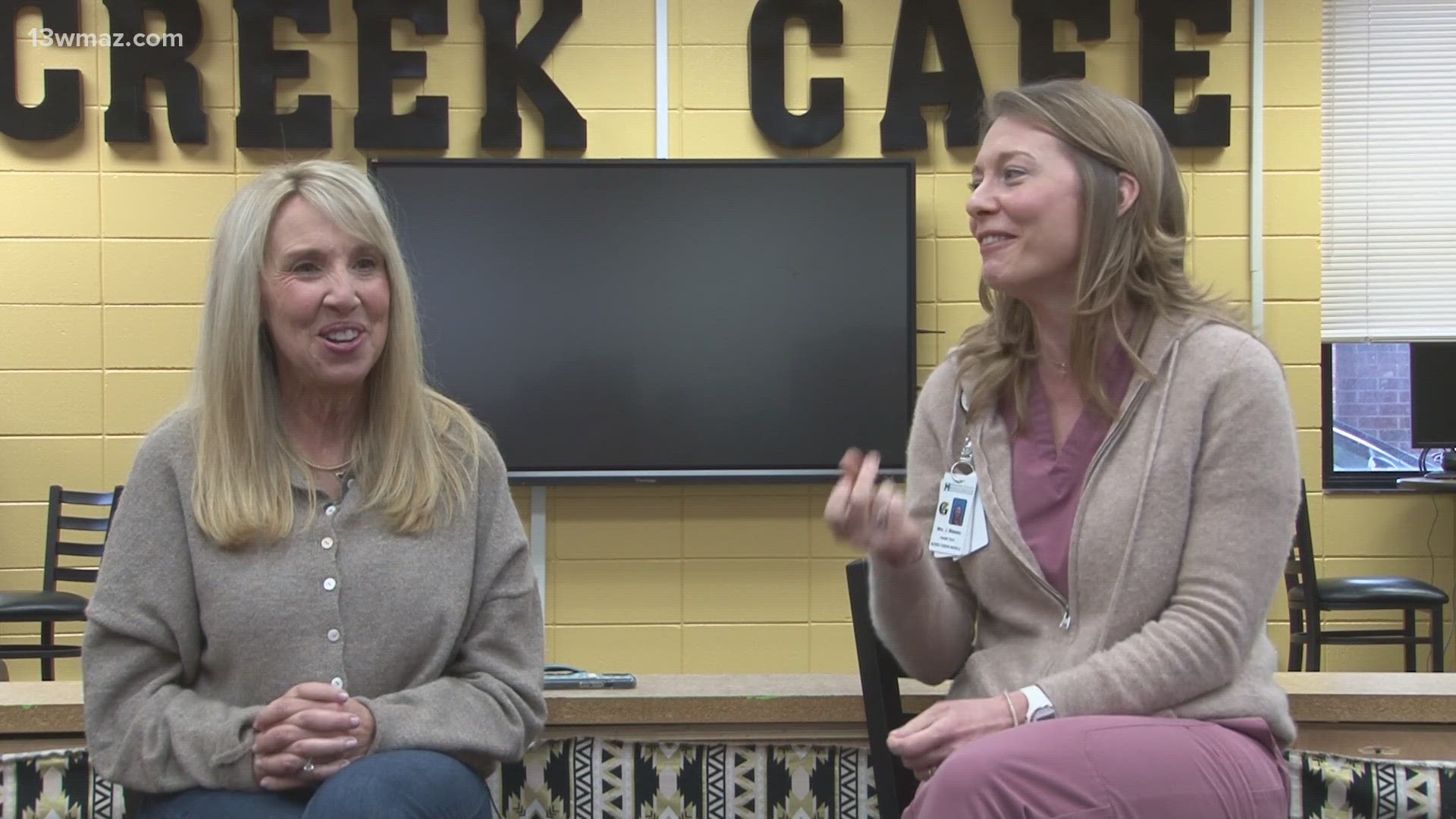PERRY, Ga. — If it weren't for certain people being at the right place at the right time, Tina Wilkinson says she would not be here on this Earth today.
But she is, and she's sharing her story and some advice Straight from the Heart.
Wilkinson was born and raised in Tennessee. She moved to Central Georgia with her husband decades ago before leaving the area because of their jobs.
But Wilkinson said she missed her community in Perry and Mossy Creek Middle School, so she convinced her husband to return to the heart of Georgia. "It just felt like family here," she said.
She said she returned to the same position as an 8th-grade language arts teacher at MCMS.
Twice a semester, the staff and faculty said they train with Automated External Defibrillators, or AED devices, just in case.
"You may be presented the opportunity to save somebody's life someday," Chris Stoner said.
Stoner is the Emergency Management Agency director of Houston County, which is about 1.7 miles away from MCMS.
"Why not have that knowledge ahead of time on something that's only gonna take three to four hours of your life to save someone else's?" Stoner continued. "We've only got one life."
A life Wilkinson said she's never taken for granted.
Before her heart attack, Wilkin said she took care of herself.
"I still do," she said. "I hardly ever had sugar, I worked out four times a week, I did max fitness, body pump, pure barre, I did everything I thought I should do to be healthy."
On January 17th, Wilkinson said she knew something was wrong when she couldn't complete her workout class before going to work.
Wilkinson said her class had left when she finally sat down at her desk and started feeling dizzy.
She mustered up whatever energy she could; Wilkinson said it was a miracle she made it to Nurse Shay Massey at the front office.
"I remember your heart rate was 79," Massey recalled as she snapped to the beat. "It was a beautiful ticking rhythm. Couldn't ask for nothing more perfect."
Massey said she's been a nurse for 15 years and worked at MCMS for three years.
As Wilkinson was sitting in the patient's seat in Massey's clinic,
"She looked over at me, and she said I feel like I'm gonna pass out," Massey said. "Then she went completely unresponsive and fell back in the chair in my office. And I picked her up, and I'm screaming, 'Code Blue, call 911!'"
Immediately, Massey checked for her pulse and felt nothing. That's when, she said, she started doing chest compressions on Wilkinson on the floor of her clinic.
All this is happening within a few minutes, Massey recalled; the staff was also playing their role.
AED training throughout the years helped them, they said, because it allowed them to jump into action and rely on muscle memory.
"We knew what to do," Massey said. "We each had a role to play; someone's calling 911, someone's getting the AED, someone's calling her family, someone's making sure the hallways are clear."
They brought out the AED device and were able to revive Wilkinson before the first responders showed up.
"I remember waking up," Wilkinson recalled. "Everyone was there in the office, and I remember saying, 'Tell my family I love 'em,' 'cuz I knew it was serious. I knew my heart had stopped, and I had died. And, I remember my assistant principal, Frank Kenney, yelling, 'I'm not gonna tell them you're gonna tell them!'"
Wilkinson said she passed out again and woke up inside the ambulance on the way to the hospital.
She remembers "the angels," Sarah and Philip, who saved her life a second time that day during her second heart attack in the ambulance.
As they were putting IVs in her, Wilkinson remembers slowly falling in and out of sleep.
Once they arrived at Houston Healthcare, Wilkinson said the last thing she remembers seeing was a crowd of doctors and nurses ready to help her.
"I closed my eyes and thought, 'I'm going to be ok. The doctors are going to take care of me; I'm going to be ok.'" Wilkinson said.
Today, by the Grace of God, she said she is.
After checking in with her doctors, Wilkinson said they told her the heart attacks happened because of stress.
These days, she's taking it a bit easier, meditating and reading before returning to work later in March.
Chief Stoner said while having an AED on hand can be lifesaving, it only works if it's fully operatable. Make sure to regularly check the batteries and supplies in the AED are up to date and charged up.
You can seek AED and CPR training at your public health department, as well as tutorials online.
"They may have been able to start my heart back, but I would've been brain dead, so this lady right here is my angel," Wilkinson said, pointing to Massey with tears in her eyes. "The entire code blue team went so smooth because she orchestrated all of it, and I owe her everything."
"On that day, all I had was the AED, our code blue team and God," Massey said.

